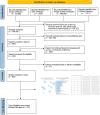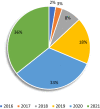Extending artificial intelligence research in the clinical domain: a theoretical perspective
- PMID: 36407943
- PMCID: PMC9641309
- DOI: 10.1007/s10479-022-05035-1
Extending artificial intelligence research in the clinical domain: a theoretical perspective
Abstract
Academic research to the utilization of artificial intelligence (AI) has been proliferated over the past few years. While AI and its subsets are continuously evolving in the fields of marketing, social media and finance, its application in the daily practice of clinical care is insufficiently explored. In this systematic review, we aim to landscape various application areas of clinical care in terms of the utilization of machine learning to improve patient care. Through designing a specific smart literature review approach, we give a new insight into existing literature identified with AI technologies in the clinical domain. Our review approach focuses on strategies, algorithms, applications, results, qualities, and implications using the Latent Dirichlet Allocation topic modeling. A total of 305 unique articles were reviewed, with 115 articles selected using Latent Dirichlet Allocation topic modeling, meeting our inclusion criteria. The primary result of this approach incorporates a proposition for future research direction, abilities, and influence of AI technologies and displays the areas of disease management in clinics. This research concludes with disease administrative ramifications, limitations, and directions for future research.
Keywords: Artificial intelligence; Clinical domain; Deep learning; Machine learning; Smart literature review.
© The Author(s), under exclusive licence to Springer Science+Business Media, LLC, part of Springer Nature 2022, Springer Nature or its licensor (e.g. a society or other partner) holds exclusive rights to this article under a publishing agreement with the author(s) or other rightsholder(s); author self-archiving of the accepted manuscript version of this article is solely governed by the terms of such publishing agreement and applicable law.
Figures






Similar articles
-
Mapping the Bibliometrics Landscape of AI in Medicine: Methodological Study.J Med Internet Res. 2023 Dec 8;25:e45815. doi: 10.2196/45815. J Med Internet Res. 2023. PMID: 38064255 Free PMC article.
-
Modeling Research Topics for Artificial Intelligence Applications in Medicine: Latent Dirichlet Allocation Application Study.J Med Internet Res. 2019 Nov 1;21(11):e15511. doi: 10.2196/15511. J Med Internet Res. 2019. PMID: 31682577 Free PMC article.
-
Artificial intelligence in spine care: current applications and future utility.Eur Spine J. 2022 Aug;31(8):2057-2081. doi: 10.1007/s00586-022-07176-0. Epub 2022 Mar 27. Eur Spine J. 2022. PMID: 35347425 Review.
-
Artificial Intelligence in Health: New Opportunities, Challenges, and Practical Implications.Yearb Med Inform. 2019 Aug;28(1):174-178. doi: 10.1055/s-0039-1677935. Epub 2019 Aug 16. Yearb Med Inform. 2019. PMID: 31419829 Free PMC article. Review.
-
Navigating the AI frontiers in cardiovascular research: a bibliometric exploration and topic modeling.Front Cardiovasc Med. 2024 Jan 3;10:1308668. doi: 10.3389/fcvm.2023.1308668. eCollection 2023. Front Cardiovasc Med. 2024. PMID: 38235288 Free PMC article.
Cited by
-
Advances and Challenges in COVID-19 and Pneumonia.Viruses. 2024 Feb 22;16(3):331. doi: 10.3390/v16030331. Viruses. 2024. PMID: 38543697 Free PMC article.
-
The impact of estrogen on benign breast tumors and exploration of recurrence mechanisms.Front Oncol. 2025 Jul 9;15:1609832. doi: 10.3389/fonc.2025.1609832. eCollection 2025. Front Oncol. 2025. PMID: 40703552 Free PMC article. Review.
References
-
- Anakal, S., & Sandhya, P. (2017). Clinical decision support system for chronic obstructive pulmonary disease using machine learning techniques. Paper presented at the 2017 international conference on electrical, electronics, communication, computer, and optimization techniques (ICEECCOT).
-
- Bai Z, Lu J, Li T, Ma Y, Liu Z, Zhao R, Wang Z, Shi B. Clinical feature-based machine learning model for 1-year mortality risk prediction of ST-segment elevation myocardial infarction in patients with hyperuricemia: A retrospective study. Computational and Mathematical Methods in Medicine. 2021;2021:1–9. doi: 10.1155/2021/7252280. - DOI - PMC - PubMed
-
- Balkan, B., & Subbian, V. (2018). Evaluating ICU clinical severity scoring systems and machine learning applications: APACHE IV/IVa case study. Paper presented at the 2018 40th annual international conference of the IEEE engineering in medicine and biology society (EMBC). - PubMed
LinkOut - more resources
Full Text Sources
Miscellaneous
